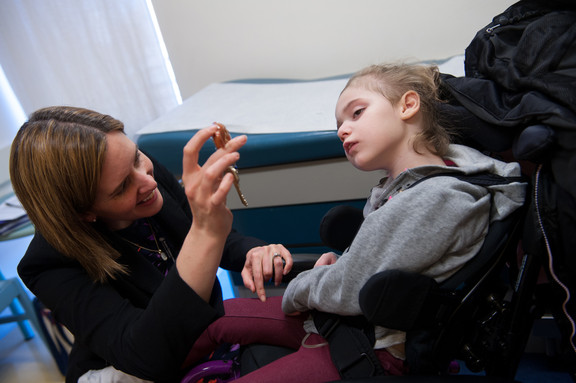
CDKL5 research team
Principal investigator: Heather Olson, MD
Study coordinators: Emily Beinecke, BA, and Grace Bazin, BS
Project manager: Lindsay Swanson, MS, CGC
All patients in the CDKL5 Clinic have the option of participating in CDKL5 research studies being offered at Boston Children’s. If you have questions about these studies, please contact the study coordinators at 617-355-5230 or by email. Additional studies may be available soon, so please ask our team if you’re interested in participating in a study.
Observational CDKL5 studies
CDKL5 Clinic Study
This study seeks to improve our understanding of the neurologic and non-neurologic aspects of the disorder associated with mutations in the CDKL5 gene and how this disorder evolves over time. We will gather retrospective and prospective medical information through medical record review, family report, physical examinations, and clinical data. We will collect information during clinic visits, gather supplemental data from your home medical team if appropriate, and request copies of MRI and EEG data if done elsewhere. Data will be collected on an ongoing basis for patients who are seen regularly in clinic, and for all enrolled subjects, we will ask for updates at least once a year.
To be eligible for enrollment, your child will need to have a determination of his or her CDKL5 mutation status. We can assist with interpretation of genetic test results in clinic. The aim is to combine the database of information collected at Boston Children’s with databases from other CDKL5 Centers for Excellence to compile as much information as possible and look for genotype-phenotype correlations (correlations between genetic findings and clinical symptoms). This information is essential to the development of clinical treatment trials going forward.
Natural History Study of Rett Syndrome and Related Disorders
Funded by the National Institutes of Health, the Natural History Study has broadened its aims to include data from people with disease-causing variants of CDKL5. The project requires additional time for a neurological evaluation that is separate from the standard clinic assessment. The study also includes parent-completed questionnaires. Study visits will take place once a year.
Laboratory studies
Human Neuron Differentiation Core
The Translational Neuroscience Center at Boston Children’s Hospital has established a Human Neuron Differentiation Core to help researchers better understand neurological disorders and hopefully lead to earlier diagnosis and better treatment for neurological disorders. The purpose of this study is to create cell lines from bio-samples from patients with specific neurological disorders to look for the cause of the disorder, and to develop new diagnostic tests and treatments for the disorder. We hope that with the knowledge gained from research done through this core, we might be able to help the participants in this core in the future. We are collecting samples from patients with mutations in CDKL5, PTEN, or SHANK3, as well as patients diagnosed with tuberous sclerosis complex, Rett syndrome, and other genetic disorders.
If you would like to learn more about participating in this study, please contact our Research Study Coordinator at 617-919-2773 or NeuroCore@childrens.harvard.edu.
EEG studies: Visual evoked potentials
Michela Fagiolini, PhD, of the F. M. Kirby Neurobiology Center at Boston Children’s uses mouse models to study experience-dependent brain development, with a focus on Rett syndrome, CDKL5, and other neurodevelopmental disorders. She has also been using specialized brain EEG recordings known as visual evoked potentials to measure visual processing in children with Rett syndrome, and believes the results can help monitor the disease and the effects of therapy. She plans similar studies in children with CDKL5 mutations, in collaboration with the laboratory of Charles A. Nelson, PhD.
CDKL5 research studies outside Boston Children’s
We encourage families to participate in these other CDKL5 studies:
Selected research publications
- Olson HE, Loddenkemper T, Vendrame M, Poduri A, Takeoka M, Bergin AM, Libenson MH, Duffy FH, Rotenberg A, Coulter D, Bourgeois BF, Kothare SV. Rufinamide for the treatment of epileptic spasms. Epilepsy Behav 2011; 20:344-348. PMID: 21233024
- Olson HE, Poduri A. CDKL5 mutations in early onset epilepsy: Case report and review of the literature. J Pediatr Epilep 2012: 1:151-9.
- Olson HE, Shen Y, Avallone J, Sheidley BR, Bergin AM, Berry GT, Duffy FH, Eksioglu Y, Harris DJ, Hisama FM, Ho E, Irons M, Jacobsen CM, James P, Kothare S, Khwaja O, Lipton J, Loddenkemper T, Markowitz J, Maski K, Megerian JT, Neilan E, Raffalli PC, Robbins M, Roberts A, Roe E, Rollins C, Sahin M, Sarco D, Schonwald A, Smith SE, Soul J, Stoler JM, Takeoka M, Tan WH, Torres AR, Tsai P, Urion DK, Weissman L, Wolff R, Wu BL, Miller DT, Poduri A. Copy number variation plays an important role in clinical epilepsy. Ann Neurol 2014; 75:303-8. PMID: 24811917
- Olson HE, Poduri A, Pearl PL. Genetic forms of epilepsies and other paroxysmal disorders (invited review). Semin Neurol 2014:34(3):266-79. PMID: 25192505
- Olson HE, Tambunan D, LaCoursiere C, Goldenberg M, Pinsky R, Martin E, Ho E, Khwaja O, Kaufmann WE, Poduri A. Mutations in epilepsy and intellectual disability genes in patients with features of Rett syndrome. Am J Med Genet A.2015 epub ahead of print. PMID: 25914188
